#greeks of diaspora
Note
greeks are indeed the main issue when it comes to spread the greek language. I live in germany and also went to a Greek school a few times a week in the afternoon (after my normal German school) and although my greek isn't perfect I dare to say I was still the best pupil speaking it bc my parents were of the few ones only speaking in Greek to me. most other parents spoke either a mix of Greek and German or straight up only German w them. partially it wasn't the parents' fault as they were 2nd gen greeks living there so they grew up in Germany, too and their parents also didn't really bother speaking to them fully greek, in an attempt to merge w their new home country and the culture (as it often happens w immigrant families). wasn't much different w my Italian neighbors either where the kids barely spoke/understood Italian. but then I see people from other countries/ continents only speaking in their native language to their kids no matter what and I'm like, why can't greeks be like this, too? I know greek isn't always the easiest especially when living in a different country. but if other immigrants manage keeping their native languages along w learning/speaking German, why can't we? or worse, they come up w new words like μπροτάκια. a mix of the German word "Brot" (bread) and the greek word ψωμάκια (buns), essentially meaning buns w it but instead of using the greek word they just mixed it w the German one 🙃 like the amount of times I met greeks (in my age) but they could barely speak greek is alarming. and it's obviously the parents/grandparents' fault. my grandpa has relatives in South Germany and when he asked them if they speak greek to their grandchildren they said no. and he told them "they're gonna learn German in school anyway. what they're not going to learn there is greek! so speak greek to them!" and I think he is right. sure you can still be and feel greek even without speaking it by just keeping traditions and other cultural stuff alive. but speaking the language helps you connect w all this and other greeks in a deeper way. so speak greek to your kids! please! it's such a nice language, it's a pity!
(sorry for the long message. just needed to vent about my personal experience a little)
Thank you for this message! I have no insight what the Greek immigrant (or just immigrant)’s experience with struggling to preserve the heritage is like but it must definitely be tough work. I understand second generation parents who don’t succeed much in teaching the mother tongue to their kids. But first generation? That’s straight out problematic. I believe your grandpa is right. Besides, it is absolutely possible for kids to learn more than one language - if a kid can learn English and another foreign language besides, say, German then they are perfectly capable of learning their own ethnic language too. If they don’t, then apparently the parents have failed or intentionally didn’t make it clear to the children what the significance of this is.
A kid desn’t understand concepts like heritage, roots, culture very well. If the parents try to teach the language as a chore or as a form of ethical obligation, it might not succeed. They should treat the language learning as something natural or obvious or if that’s not easy then as something fascinating or useful IMO. Because I have received mail from Greeks of the diaspora who weren’t taught Greek well by their family and they realise they want to know it only in late puberty or adulthood, when the aforementioned concepts are better understood. This is generally something that usually interests people when they grow and mature. But when a lot of time has passed people often make the mistake to feel that maybe they lost their chance or the cord is cut for good now or that they wouldn’t be able to get connected on a deeper level even if they tried. Which is wrong of course, you can (re)gain the lost touch at any age as long as you genuinely try to. But the neglect or avoidance of the parents (for whatever reason) in this matter makes it so much more difficult for their offspring later.
This of course applies to all immigrants struggling with the preservation of their language and culture. The immigrants you mentioned, who still succeed a lot in that are probably ones where tradition and religion have a very strong influence in the structure of their family / society so it is necessary for them. Not always, but usually, I think.
55 notes
·
View notes
Note
a perspective on being μια ελληνίδα του εξωτερικού (γεννήθηκα ελλάδα, μεγάλωσα σε τρείς διαφορετικές ηπείρους)
είναι σουρεάλ που είμαι μετανάστης και μέρος του greek diaspora aka ελληνίδα του εξωετρικού αλλά δεν σκέφτομαι ποτέ ότι είμαι μετανάστης. σίγουρα μεγάλο ρόλο παίζει ότι είμαι λευκή, και μέχρι να ανοίξω το στόμα μου και να αποκαλύψω τα άθλια γαλλικά μου, δεν φαίνεται η διαφορά. ίσως είναι και ότι δεν αισθάνομαι ότι "ζω" στο εκωτερικό, αλλά περισσότερο ότι απλά είμαι εδώ για ένα μεγααααλο χρονικό διάστημα (βσκ το μεγαλύτερο μέρος της ζωής μου για να λέμε την αλήθεια). και ότι η "κανονική" μου ζωή είναι στην ελλάδα, όπου θα επιστρέψω κάποια στιγμή.
επίσης, οπουδήποτε και να πάω, ελληνικά μιλάω. πήγα σε ελληνικό σχολείο και έκανα παρέες με ελληνίδες. η κομμώτρια, ο οδοντίατρος, ο υδραυλικός, η αιστθητικός μου είναι όλοι έλληνες. όπως πολλοί μετανάστες, φτιάξαμε μια δική μας κοινίτητα στην πόλη μας. αλλιώς δεν παλεύεται.
από κει και πέρα, στιριζόμαστε σε άλλες κοινότητες μεταναστών. μια φορά τον μήνα περίπου πάμε σε συριακό σούπερ μάρκετ για να αγοράσουμε πράγματα που δεν βρίσκουμε αλλού, πχ αμπελόφυλλα για ντολμαδάκια, κατεψηγμένα σουβλάκια και τυρόπιτες από την ελλάδα (ναι, το συριακό σούπερ μάρκετ εισάγει ελληνικά προϊόντα!)
δεν αιθάνομαι 100% ελληνίδα (αυτό είναι άλλη πολύ μεγάλη συζήτηση. σίγουρα όμως δεν αισθάνομαι και ότι έχω απομακρυνθεί από την ελλάδα. είμαι σε ένα περίεργο ενδιάμεσο, που δεν ταυτίζομαι με τις εμπειρίες των περισσότερων ελλήνων μεταναστών, που κάνουν χρόνια να γυρίσουν ή δεν γυρνάνε ποτέ, και κάνουν assimilate εντελώς. αλλά δεν είμαι και από αυτούς που έχουν το ένα πόδι στην ελλάδα. ούτε όμως είμαι και η στάνταρ ελληνίδα.
φαντάζομαι ότι πολλοί που σε ακολουθούν θείτσα μ ταυτίζονται με αυτό. η αλήθεια είναι ότι και εσύ έχεις το βάιμπ της ελληνίδας του εξωτερικού. ή εγώ κάνω project πάνω σου lol. λοβ το μπλογκ σ βτγ <3
Συγγνωμη για την καθυστέρηση στα asks... Αυτές οι εβδομάδες ήταν τρα-γι-κές😅
Ευχαριστώ για το μηνυμα σου και το γεγονός ότι μου/μας εμπιστεύτηκες τα συναισθήματά σου. Με τόσους (κυρίως) Έλληνες να εχουν φυγει εξωτερικο πιστεύω οτι σιγουρα καποιος αλλος βρισκεται σε μια παρομοια κατασταση με τη δικη σου. Από φίλους μου που εχουν φυγει στο εξωτερικο για σπουδες (δηλαδη σχεδιαζουν να γυρισουν) ακουω παρομοια πραγματα. Βασιζονται στις ελληνικες κοινοτητες εκει, εχουν δεθει με αλλους Βαλκανιους ή Μεσανατολίτες και πάντα λατρευουν τα μαγαζιά των γειτονικων μας λαων γιατι εχουν ιδια/παρομοια υλικα με τα δικα μας. Τωρα βεβαια δεν ξερω "ποσο Ελληνες" αισθανονται. Αλλα πιστευω οτι θα εχουν συνηθισει και καποια πραγματα του εξωτερικου, με αποτελεσμα να μην τους αρεσει πλεον το Ελληνικο στυλ πληρως.
Απο την αλλη, ειμαι και εγω αρκετα ελαστικη και λεω οτι δεν υπαρχει μονο ενας τροπος να εισαι και να αισθανεσαι Ελληνας. Αλλιως ειναι ο Ελληνας στη Μελβουρνη και αλλιως στο Βερολίνο, αλλα και παλι εχουν την Ελληνικη κουλτουρα μεσα τους. Δε χρειαζεται να ειναι κανείς 100% σαν τον μεσο Ελληνα. Εδω αρκετοι Ελληνες στην Ελλαδα δεν ειναι "σαν τον μεσο Ελληνα". Ειναι καλο που εχεις και μια διαφορετικη εμπειρια. Σιγουρα θελεις να ταυτιστεις και με τους αλλους Ελληνες μεταναστες αλλα υπαρχει και κατι θετικο στο γεγονος οτι ζεις μια μοναδικη και ενδιαφερουσα εμπειρια. Θα εχεις αντιστοιχα και μια μοναδικη οπτικη αναμεσα σε τοσους αλλους "ιδιους", που ειναι παντα καλο ;)
Ούτε εγω αισθανομαι σαν τον μεσο Ελληνα και η αληθεια ειναι οτι ειμαι μειονοτητα με παραπανω απο εναν τροπους, οποτε αυτο ισχυει. (δεν εννοω οτι ειμαι κατι ανωτερο προφανως) Ταυτοχρονα μοιραζομαι κ εγω αρκετα Ελληνικα χαρακτηριστικα.
Επειδη διατηρω επαφες με το εξωτερικο και με ξενους που ερχονται Ελλαδα, καποιες φορες νιωθω κι εγω οτι ειμαι μονο με το ενα ποδι στην Ελλαδα - αλλα καλως ή κακως γεωγραφικα ειμαι εδω 😂
Ευχομαι να εισαι καλα, να περνάς καλα, και να εχεις παντα ενδιαφερουσες στιγμες!
=====================================
If my posts have helped you in any way consider buying me a ko-fi 💖
#το μηνυμα με το κοφι το βαζω γενικα σε ποστ μου#δε σημαινει οτι θελω το ατομο που κανει την ερωτηση να μου πληρωσει κατι#greek speaks#greeks of diaspora#answered#greek diaspora
7 notes
·
View notes
Text
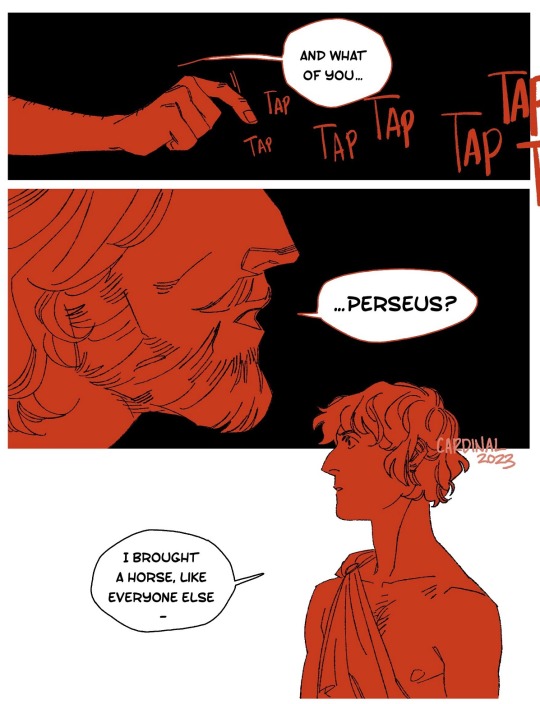
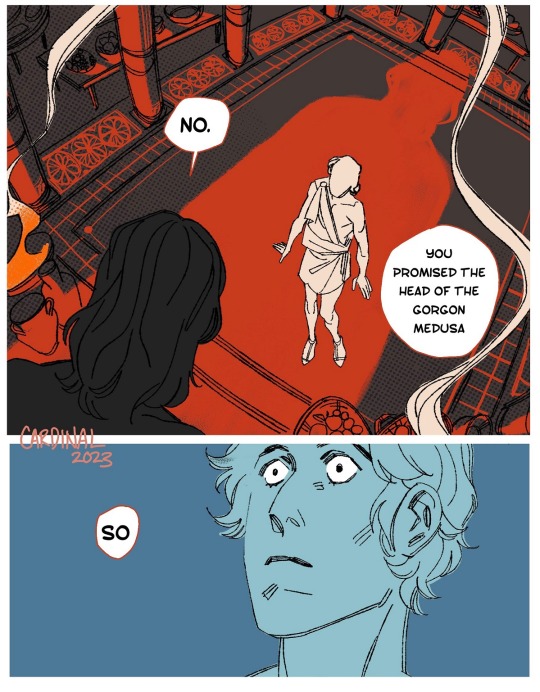
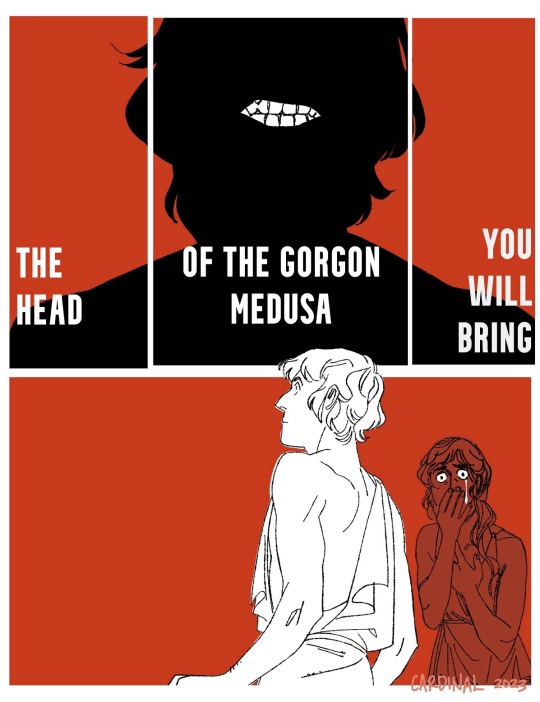
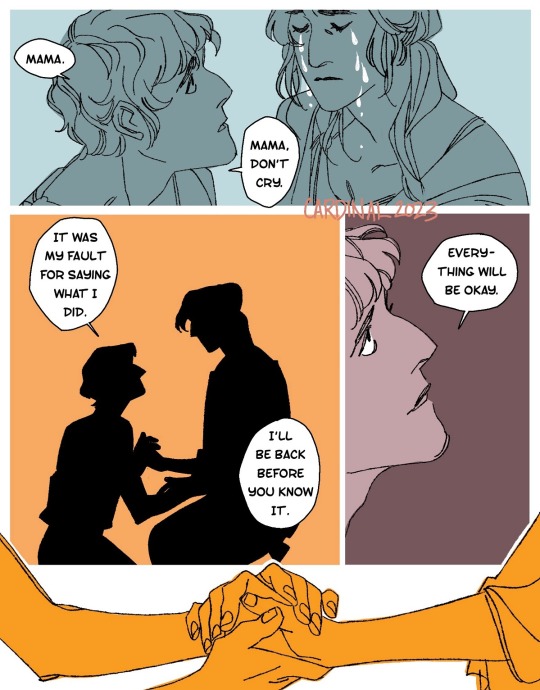
something. about. the horror of being sent on an impossible (death) quest and obligations and hospitality politics. the trauma of not having a home, and then the trauma of being in a house that becomes actively hostile to you, one that would swallow you whole and spit out your bones if you step out of line. all of this is conditional, your existence continues to be something men want gone.
it's about going back as far as I can with the perseus narrative because there's always a version of a myth that exists behind the one that survives. the missing pieces are clearly defined, but the oldest recorded version of it isn't there! and there's probably something older before that!! but it's doomed to forever be an unfilled space, clearly defined by an outline of something that was there and continues to be there in it's absence.
and love. it's also about love. even when you had nothing, you had love.
on the opposite side of the spectrum, this is Not About Ovid Or Roman-Renaissance Reception, Depictions And Discourses On The Perseus Narrative.
edit: to add to the above, while it's not about Ovid, because I'm specifically trying to peel things back to the oldest version of this story, Ovid is fine. alterations on the Perseus myth that give more attention Medusa predate Ovid by several centuries. this comic is also not about those, either! there are many versions of this story from the ancient world. there is not one singular True or Better version, they're all saying something.

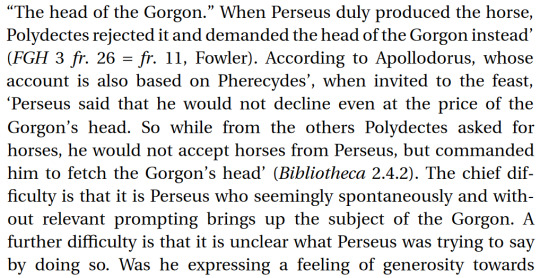
Perseus, Daniel Ogden

Anthology of Classical Myth: Primary Sources in Translation, edited & translated by Stephen M Trzaskoma, R. Scott Smith, Stephen Brunet
#it's all greek to me#perseus#danae#komiks tag#long post#every other week i start to say something about how greek heroes are a good case study in diaspora and exile trauma#but man perseus makes me so sad. so does danae. she loves her son :(#perseus turning a whole island to stone is a huge mood. i would also do that if i were him#anyway (salutes) take care everyone i gotta watch yunho's new video it looks like a fucking movie im so excited#(i singled out ovid bc i remember the fucking shit perseus discourse that ran through this site. i remember#im preemptively loading a gun and pointing at it before it can touch this post#it hasn't died out either i see it on twitter all the time in the most ANNOYING ways possible i am TIRED#esp bc they're actually doing medusa a narrative disservice like congrats! you made it worse! stop telling me it's better!!!!)
6K notes
·
View notes
Text
obsessed with the whole jyn and cassian as penelope and odysseys thing like the metatextual levels of the Ordinary Human couple in the midst of this mass mythos of gods and war but also the sense they are for almost their entire lives separated and yet inexorably bound by the narrative, they are threaded together they are looking in a mirror they are drowning in the wine dark sea they are standing on the beach they are the warp and weft they are coming home to each other they have never not once in their lives yet met
#the cassdyssey#cassian andor#jyn erso#rebelcaptain#i have been preaching and saying and now i see other people finally picking up??? anyway#kyber crystals. olive tree bed u know. u knowwww#ok i AM thinking specifically abotu the odyssey's storyline and treatment in the lens of more modern greek writers#as an exploration of the traumas of war and diaspora and exile#the way the odyssey explores death as a trauma of war#but also exile also removal from a homeland and family separation#through the lens of cassian's story which also explores some of this#like odysseus and telemachus are different from many of the father son duos in classical storytelling#because they are a tragedy but neither died#odysseus just wasn't physically /there/ to see his son grow up and that is a tragedy! that's a tragedy worthy of a narrative!#like whenever i return to the odyssey i'm so profoundly struck by the nuance of its exploration of pain and trauma in a way#it's saying you may die in this war but those who live are still lost at sea going home#there are many sorts of pain the survivors carry#anyway odyssey thoughts it's fascinating to me#jyn and cassian are penelope and odysseus's equal and opposite reaction in terms of like#jyn and cassian only know each other for a very short time and then die?#well penelope and odysseus really only know each other for a fairly short time (i mean. they only have one kid and it's classical greece....#and then they're forced to LIVE. they're forced to LIVE apart but that relationship is still so important and self-defining#and part of their individual maintenance of identities even when they are both in different ways trapped and controlled by outside forces#when the suitors come penelope is odysseus's wife. on kalypso's island odysseus is penelope's husband#anyway!!!! stream the song 20 years by the civil wars
85 notes
·
View notes
Text
I know it's common for US Americans not to speak our ancestors' languages for various reasons, but having to explain why I can't speak Greek to my 12-y-o cousin was still a very melancholic experience, honestly.
#not my cousin on the greek side—he just vaguely figured i could and then was 'oh okay' when i couldn't#meanwhile i was just sort of staring blankly ahead into the abyss of diaspora feelings#:(#anghraine babbles#ellinoamerikana blogging#linguistic stuff#us american blogging
23 notes
·
View notes
Text
Greeks every time they see a Greek name in the credits

#greek#greek immigrant#greek representation#greek culture#greek diaspora#child of immigrants#it’s the snap too#and the little smile#gotta love it
3 notes
·
View notes
Text
.
percy jackson is mid and also what happened to the fucking disney+ boycott everyone kept saying they'd do
#I will block that now actually do I'm not going to be any more antagonistic about this#dots dots dots#thinking about that one video essay about someone from the Greek diaspora that was like#'the reason people dislike the stuff you're correcting them on is always bc of percy jackson or some shit'#also like you know when you're boycotting a show it isn't just not subscribing. it's also not spreading it in general
1 note
·
View note
Text
Watching dubbed movies to learn a new language sounds like a great idea until you realize that the English subtitles are for the original English version so they don't match the translation and the Greek subtitles are just fully wrong
2 notes
·
View notes
Text
Anyway they gave me some more Marwa kernels and I’m ready to collect those kernels to make a bucket of popcorn, aka more Marwa fic. at some point. idk
#wwdits spoilers#what we do in the shadows#marwa chatting with the guide about her mamma mia theories <3#written by me#also holding hands meme nadja using mamma mia to connect with her greek heritage and me using this dipshit show#to project on nandor about my own diaspora shit re: my iranian heritage
20 notes
·
View notes
Text
My Scandi friend: ‘I’ve managed to trace my family tree back to the 19th century. I’ve even been able to find photos and documents about them! You should do the same! 😍’
Me, with Greek and Armenian ancestry with no knowledge of either language and with a dysfunctional family on one side: ‘absolutely 🥲🥲🥲💔’
#I’ve always felt like a piece of me has been cut out#greek diaspora#Armenian diaspora#greek#Armenian
1 note
·
View note
Note
Re: the anon writing about globalization of Greek media (I am not that anon, I understand the premise but I disagree with their conclusion), also like… it's nice for Greeks who live outside the country to be able to see shows in our language, from our own country. And to be able to share them with our friends, but even setting aside sharing our media with "foreigners" (which... what is wrong with that, I first heard about Maestro from a Persian friend who was incredibly excited about it), Greece is not the only place Greeks live and it can be really difficult to access Greek media if you aren't actually living there.
^^^
23 notes
·
View notes
Note
Hi Theitsa! I'm going to send two asks, but this first one is just about how I went to see Giannis Ploutarxos when he came to tour in California! His concert was amazing, it lasted until 3 am and I had so much fun surrounding by other Greek people (and a surprising amount of Armenians as well!) My mom hadn't gotten to go to a Greek pop concert in so long, especially since she immigrated to America, and she was really happy as well 🥹
Hello!! Ooooo you saw Ploutarxos!! That must've been a great show, especially with all the other partying Greeks around! I got very happy when I imagined all the joy your mother had!! May you and her be always well! 💙
4 notes
·
View notes
Text
I need to stop plaguing myself with the Sisyphean workload that is classics breadth studies
#I have gotten High Distinction equivalents in all subjects except the classics#My best classics assignment was effective only because I used a framework of literary analysis in order to discuss the greek diaspora#latin almost killed me#but latin almost killed me because everytime i tried to study for my final exam a creep would come and leer at me in the tute room#strange times#keep classics within the home!!
0 notes
Text
Yo Gentiles! Looks like I'm going to need to give some of you a crash course on what antisemitic language looks like, because I've been seeing entirely too much of it from some of you here on Tumblr.
Now, I think it's time for a Jewish history lesson, because I've been seeing way too many Nazi-related conspiracy theories going around. If you hear contradictions to the basic information that I am about to share (i.e., if you hear someone saying that the Jewish people are "a race that originated in Europe"), it is likely that you are hearing a white supremacist, anti-Jewish conspiracy theory.
So, here's the basics of Jewish history. Jews are indigenous to the Levant have been there for thousands of years. The Levantine people that Jews descended from have been in that area of the Levant since the Bronze Age. Jews as a distinct people have been there since the Late Bronze Age. Before it was Palestine it was the Kingdom of Judah, then Judea, and then Judaea, and that is literally where we are from. The word Jew means "a person from the Kingdom of Judah." The Romans renamed the area Syria-Palaestina (which they borrowed from the Greek name Palestina) in the 2nd century CE after destroying the Second Temple in Jerusalem and leading another campaign to try to eradicate the Jewish people (guess what, we're still here, motherfuckers).
And even after the Romans tried to annihilate us, even after they scattered many of us into European diaspora, many Jews came back, again and again over the ages, and there have nearly always been Jewish communities in the region throughout history.
And if you come for me or try to dispute any of this history with white supremacist bullshit, I am a Jew who has studied way more Jewish history than you. And as politely as possible, you can take your white supremacist conspiracy theories and fuck off into the sun.
Okay, with all that out of the way, let's get into it!
Gloves are coming off, because this is just a sampling of the Nazi dogwhistles I've been seeing here on Tumblr about the Jewish civilians who were tortured, murdered, and worse:
- If you say shit like, "The Jews got what they deserved"...
GUESS WHAT? You're talking like a white supremacist, and you need to fucking check yourself.
- And if, on the other hand, you say shit like, "The reports were probably overblown. I think those were paid actors. I don't think those Jews were murdered. No Jewish children were killed. No Jewish bodies were desecrated" blahblahblah...
GUESS WHAT? You get to sit with the Nazis at their table for lunch.
- If you tell Jews "go back to Europe where you came from"...
GUESS WHAT? Not only are you telling the descendants of Jewish refugees to go back to the Spanish Inquisition, the Russian pogroms, and the Nazi gas chambers, as I explained in this post, but you are also repeating a white supremacist conspiracy theory about the origins of European Jews.
Jews are a Levantine people from the area of the Middle East currently called Israel (formerly called the Kingdom of Judah, and then Judea). While there was some emigration to Europe during the late Roman Republic and the early days of the Roman Empire, the first mass migration of Jews to Europe was a forced migration. Gentiles from the Roman Empire dragged us there as captives after 70 CE, the year Rome destroyed the Second Temple.
- And if you're telling yourself that there are "good Jews" and "bad Jews," and those Jewish civilians were "bad Jews," so they deserved to be tortured and killed...
GUESS WHAT? You're spouting white supremacist ideology.
Antisemitism takes a long time to deprogram.
A lot of gentiles grow up with anti-Jewish ideology that they have never questioned.
And a lot of Christians are kept ignorant about Jewish history because preachers and priests fear it would make Christians question the many inaccuracies in the Bible.
But the first step in noticing antisemitic beliefs is to notice when you start singling people out *because* they are Jewish.
And I have been seeing some of you gleefully celebrating the murder of Jewish civilians *because* they are Jewish.
And that is antisemitism.
That is one step closer to the next generation of Jews getting shoved into the gas chambers. And there are only 16 million of us left in the entire world. We're 0.2% of the world's population. And we cannot afford another Holocaust.
And if your response to me saying that is, "Well, those Jews deserve it."
Guess what. You are making it easier for Nazis and white supremacists to spread hatred and commit acts of violence against Jewish people. And you will have to live with that blood on your conscience.
So...
If you are a gentile, and you see other gentiles repeating these kinds of white supremacist dogwhistles about Jewish people, here's how you can help:
1. MOST IMPORTANTLY: Help them direct their focus away from attacking random Jewish people online and towards helping Palestinians.
Actions that people can take right now are contributing to verified charities and relief organizations that help the people of Gaza. Some organizations that are verified by CharityNavigator.org and CharityWatch.org are:
Anera (92% rating on Charity Navigator)
Palestine Children's Relief Fund (97% rating on Charity Navigator)
Doctors Without Borders (98% on Charity Navigator)
2. Call that shit out. Tell people that they're being antisemitic, and explain that Jew-hatred is dangerous to Jewish people. Antisemitism gets Jews attacked and it gets Jews killed. In the US, many synagogues require round the clock security to protect against white supremacists who want to murder Jews. In Pittsburgh, my old home town, a group of Nazis from north of the city planned the murder of Jewish congregants at Tree of Life Synagogue, and so far only one of them (the gunman) has been arrested and convicted of the murders. The others are still at large.
3. Explain to them that it is antisemitic to celebrate someone's death *because* they're Jewish. ALSO, it is antisemitic to blame a random Jewish person for the actions of ANY government, whether that be the Israeli Government or the US Government.
4. Explain to people that they're not going to solve this conflict by posting antisemitic statements and memes online. All they will do is alienate the Jewish people in their lives and make those Jews feel scared and unsafe. And they will contribute to this current wave of antisemitism.
Antisemitic hatred doesn't help Palestinians. All it does is put Jewish people around the world in danger.
#tl;dr if you celebrate the murder of jews *because* they are jews you are an antisemite - end of story#just fyi - i will be monitoring the comments so if anyone posts anything antisemitic i will delete your comment and block you#antisemitism tw#jumblr
4K notes
·
View notes
Text
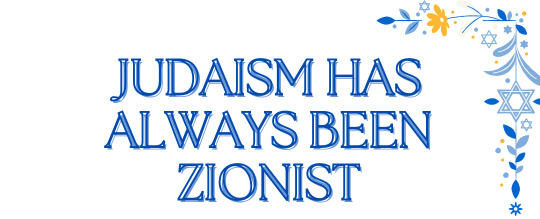
Judaism is a native religion and identity, so like all indigenous religions, it has ALWAYS sanctified the bond between the tribe and its ancestral land:
* Jews, no matter where around the world we are, pray in the direction of the Hebrew Temple in Jerusalem.
* Israel, Jerusalem, and Zion are mentioned in the Hebrew Bible hundreds of times, often in connection to the importance of the bond between the land and the Jewish people.
* The Hebrew calendar and Jewish holidays are based on the agricultural year as experienced in the Land of Israel. For example, we celebrate Shavu'ot, the Jewish festival of the harvest, during the Hebrew month of Sivan, which is roughly around the Gregorian month of June. In Australia, June is the rainiest month of the year, with severe temperature drops, absolutely not the right time for the harvest. But Australian Jews still celebrate Shavu'ot at the same time as all other Jews, around June. Because we ALL honor and preserve the agricultural cycle of our ancestors in Israel.
* Many Jewish prayers express a desire to return to Israel, for example with the phrase, "Next year in Jerusalem."
Here's a greeting card, drawn at Linz, a Nazi concentration camp in Austria, which was turned into a DP (displaced persons) camp at the end of the war. The card features the above three Hebrew words (you can see the freed prisoners of the camp on the left, heading towards a land with palm trees on the right, with one of the buildings having a Star of David on top):
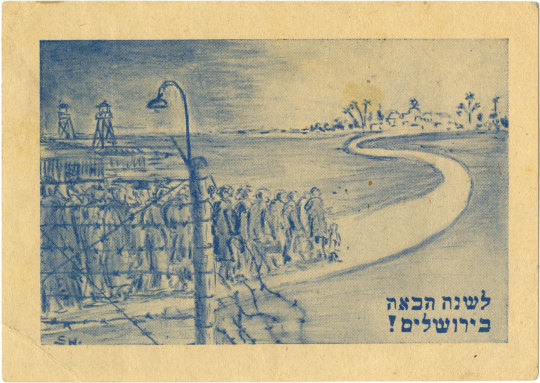
* The holiest site for Jewish people in the entire world is the thousands of years old Temple Mount in Jerusalem, where the Jewish temple stood, in Israel.
* Several Jewish holidays explicitly celebrate the Zionist notion, meaning the importance of the bond between the Jews and the Land of Israel. Hanukkah is a celebration of the native Jews fighting off the Greek occupying forces, and re-establishing Jewish sovereignty in Israel, and the freedom from religious persecution this allowed Jews, by re-dedicating the Hebrew Temple in Jerusalem to Jewish worship, after it was defiled by the Greeks (including by re-lighting the Temple Menorah). Passover celebrates the deliverance of the Jews from Egypt, and the start of their journey back home, to their ancestral land in Israel, with the Passover meal ceremony including thanking God for bringing Jews back to Israel, and for building the Temple in Jerusalem for them.
* The language of the Jewish people is Hebrew, which is the last Canaanite language, the last of the languages spoken by the native peoples of Israel. Hebrew is specifically tied to the geography of Israel. For example, in the Bible, the Hebrew word for "west" is also the Hebrew word for "sea," because Israel's western border is the Mediterranean Sea. Similarly, the Hebrew word for "south" is also the Hebrew name of the desert that makes up the southern part of Israel, the Negev. Every Jewish language, which developed in the diaspora (such as Yiddish and Ladino), features words borrowed from Hebrew.
Here's an Israeli poster made in 1949, honoring "Sea Day" and featuring a part of a biblical verse (Genesis 28, verse 14): "And your seed shall be as the sand of the earth, and you will spread to the sea and to the east, to the north and to the Negev, and blessed in you and in your seed will be all the families of the Earth."

* Among the 613 Jewish mitzvahs, religious decrees that Jews must observe, one explicitly states that whenever possible, Jews should strive to live on their ancestral land in Israel. This is called in Hebrew, "mitzvat yishuv Eretz Yisrael."
* Among the 613 mitzvahs, there are 26 mitzvahs that can only be observed while living in the Land of Israel. These are called in Hebrew, "mitzvot ha'tluiot ba'aretz."
* Jewish homes have included for centuries a decorative piece hung on the eastern wall, and called "mizrach" (the Hebrew word for "east"), because that was the direction of Israel to most Jews. It usually included a biblical verse in Hebrew, often one that either mentions the east, Israel or Jerusalem, and also illustrations of Jerusalem or Israel.
Here's an 18th or 19th century mizrach from Germany:
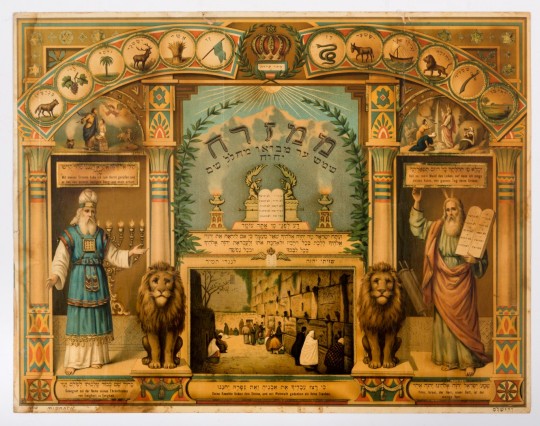
* In Jewish synagogues, especially in Europe, the eastern wall was the most important one, because it was the one facing Israel. This wall was called, "kotel ha'mizrach" which means in Hebrew "the wall of the east."
* Oh, but the word "kotel" refers specifically to the walls of the Temple Mount. For example, the Western Wall, the only one of the Temple Mount's four walls accessible to Jews for centuries (and therefore the plaza in front of it became the second holiest place to Jews, after the Temple Mount itself) is called in Hebrew, "ha'kotel" (the wall). So why would a synagogue wall be referred to as "kotel" as well? Because every Jewish synagogue is called "mikdash me'at," a lesser temple. Every Jewish synagogue is a reminder and placeholder for the destroyed Jewish Temple in Jerusalem.
* Accordingly, many Jewish synagogues feature reminders of the Beit Ha'Mikdash (the Hebrew Temple). For example, this holy ark, from a synagogue in Romania, which survived the Holocaust, and is today presented at Yad Vashem (Israel's national Holocaust museum), includes two pillars on its sides, a reminder of the Temple in Jerusalem's pillars believed to have been build by King Solomon. The holy ark's pillars are named exactly like the Temple's two pillars, Boaz and Yachin. This holy ark also features two hands, they're meant to be the high priest's, while he's performing the priestly blessing, an ancient Jewish ceremony that was conducted on the steps of the Temple in Jerusalem.

* In fact, over the centuries, one of the most prominent Jewish symbols is the menorah, which is a reflection of the candelabra eternally lit in the Jewish Temple in Jerusalem.
The Temple Menorah being stolen by the occupying Romans, as seen on the Titus Arch in Rome:
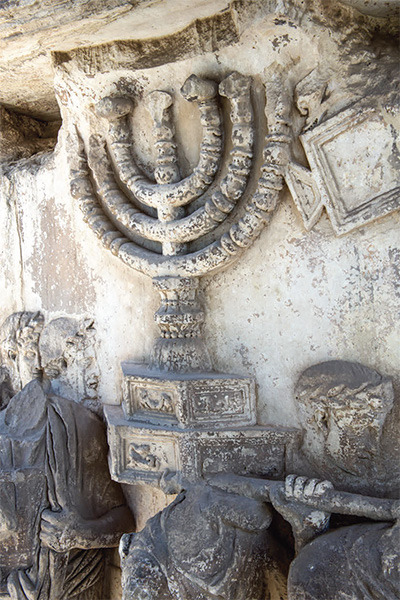
The menorah as incorporated into jewelery, as a Jewish symbol, goes back thousands of years:
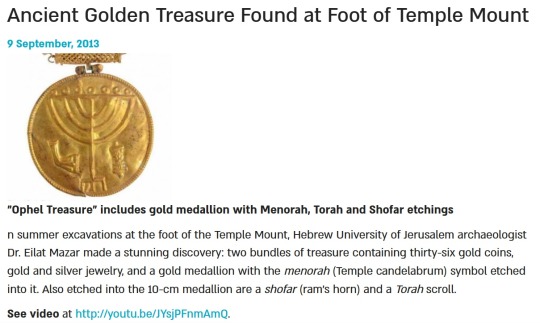
* For centuries, Jews created Jewish art and culture, which expressed Zionist longing. For example, the Sephardi doctor, philosopher and poet Rabbi Yehuda Ha'Levi writes what is maybe the most famous of the "Zion poems" while living in Islamic-occupied Spain: "My heart is in the East, and I am at the end of west / How shall I taste what I eat, and how should it be an enjoyable taste? / How shall I repay my vows and commitments, while / Zion is in the ropes of Edom, and I am in the bonds of Arabia? / It would be easy for me to leave all of the good of Spain, just like / It would be precious to me to witness the ashes of a ruined temple."
* In 1140, Rabbi Yehuda Ha'Levi finally fulfilled his wish, and boarded a ship for the Land of Israel. We don't know what happened to him, but the phrasing in a Hebrew letter, written by Jews who knew him, and found in Egypt, implies that he was murdered. For almost 2,000 years, it was dangerous for Jews to try and return to Israel, and it certainly wasn't possible on the scale of a national movement. Jews knew it was dangerous. And yet for centuries, despite that, individual Jews like Rabbi Yehuda Ha'Levi persisted in attempting this return. This is a part of Jewish history. It's not just that there was a small number of Jews, who managed to remain in Israel despite the repeated expulsions and massacres of Jews from our land, it's also that there was a small number of Jews who dared attempt the return to Israel continuously, over centuries, and neither of these things would have happened had Judaism not been Zionist. Always.
* For centuries, every Jewish wedding includes a part, where the groom recites an oath of loyalty and longing for Jerusalem. The text itself is taken from the Bible, from the second part of Psalms 137: "If I forget you, Jerusalem, let my right hand forget itself, let my tongue be glued to the roof of my mouth if I do not remember you, if I do not raise Jerusalem at the height of my joy."
* For centuries, every Jewish wedding included a symbolic reminder of the destruction of the Temple in Jerusalem, and our ancestors' following expulsion from the Land of Israel, by breaking a cup made of glass.
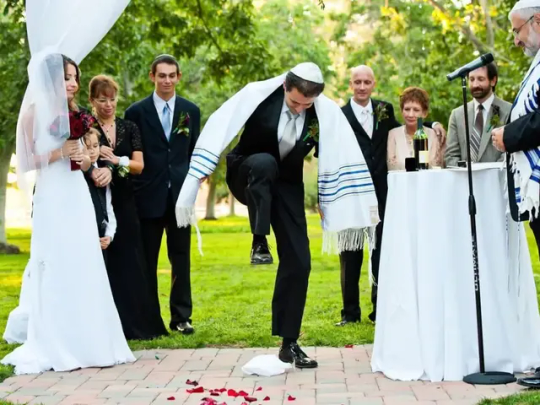
* For centuries, many Jewish homes featured an unfinished patch, as a similar reminder. I'm a secular Jew, but my real life bestie is religious, and her house has a hole in the eastern wall, intentionally left there.
* In fact, the destruction of the Temple, and the following expulsion of the Jewish people from Israel, is SUCH a traumatic and significant event for the Jewish faith, that there is a religious national day of mourning every year, on the ninth day of the Hebrew month of Av (the date when Jews believe the first Temple was destroyed in Jerusalem by the Babylonian occupiers, and the second one, re-built after an expulsion and return of the Jews from Babylon to their native land, was destroyed by the Roman occupiers), when Jews fast.
* Ethiopian Jews, who were probably the most disconnected Jewish community along the centuries, have a special holiday, called Sigd. This name is derived from the Hebrew word for worship or prostration, "sgida." It features asking God to return them to Israel. Since the state of Israel has helped the Ethiopian Jewish community to return to this land, starting in 1982, it has become a part of Sigd to celebrate it specifically in Jerusalem.
The Ethiopian Jewish community celebrating Sigd in Jerusalem:

* In fact, the three major Jewish holidays, other than Yom Kippur, are also called "the three pilgrimages" ("shloshet ha'regalim"), because while the Temple stood in Jerusalem, they included all Jews coming there to celebrate the holiday together. These three holidays are Sukkot, Pesach (Passover) and Shavu'ot.
Here's a piece of art depicting Jews in antiquity, coming from all over Israel to the Temple in Jerusalem for sholoshet ha'regalim:
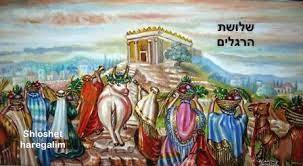
* The Hebrew Bible itself expresses the Jewish Zionist longing, the desire of the Jews to return to their ancestral land no matter what, after they were expelled by the Babylonians from Israel, the same desire that drove their return from their first exile, as recorded in the Bible, and supported by historical documents and archaeological finds. Here's the first part of Psalms 137:
Upon the rivers of Babylon, there we sat, and we wept, as we remembered Zion. On willows there we hung our harps, because there our captors asked us for songs, and our tormentors for joy. "Sing to us from the song of Zion!" How shall we sing God's song on foreign soil?
and here's the craziest thing about this list: there's a good chance I forgot some stuff.
This is posted in honor of the first candle of Hanukkah tonight, and the many Tumblr antisemites, who distort Jewish identity and history by claiming Zionism is incompatible with or has nothing to do with Judaism, people who in the name of anti-Zionism celebrated the biggest massacre of Jews since the Holocaust, who ignore Jews pointing out that anti-Zionism is inherently antisemitic, who prove it by going out of their way to deny Jewish native rights, and who think posting "Happy Hanukkah to my Jewish followers!" (as if Hanukkah isn't a Zionist holiday) covers up their antisemitism.
Happy Jewish sovereignty in Israel holiday to all who celebrate Hanukkah! I hope you really enjoy its foods! xoxox

(for all of my updates and ask replies regarding Israel, click here)
#israel#antisemitism#israeli#israel news#israel under attack#israel under fire#terrorism#anti terrorism#hamas#antisemitic#antisemites#jews#jew#judaism#jumblr#frumblr#jewish#hanukkah#chanukah#resources
778 notes
·
View notes